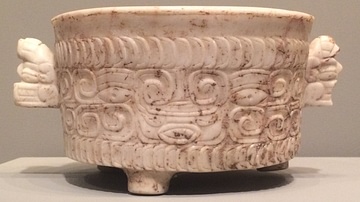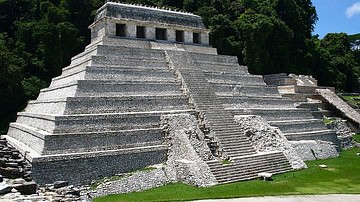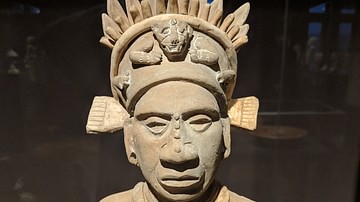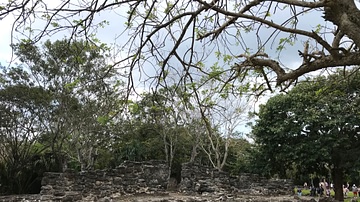Search
Did you mean: Gaya?
Search Results

Image
Maya Marble Vessel
A Maya tripod marble vessel. Travesia, Cortés, Honduras, 600-909 CE. (St. Louis Art Museum, Missouri)

Article
The Red Handprints of Cozumel & Tulum
The Maya sites of San Gervasio (on the island of Cozumel) and Tulum (on the mainland of Mexico in Quintana Roo) are often overlooked for the better-known Chichen Itza or other spectacular ruins further inland but both these locations have...

Definition
Kukulcan - The Feathered-Serpent God of Mesoamerica
Kukulcan (pron. Koo-kool-kan) is the name of a feathered serpent god in the mythology and religion of Mesoamerica, in particular, the Yucatec Maya. He is also identified as the feathered serpent god Quetzalcóatl by the Toltecs and Aztecs...

Definition
Palenque
Located in the foothills of the Chiapas altiplano of modern Mexico, Palenque was an important Maya city which flourished between c. 600 and 750 CE. The name Palenque derives from the Spanish, meaning 'fortified place', but the original Maya...

Video
Maya Site of Copan (UNESCO/NHK)
Discovered in 1570 by Diego García de Palacio, the ruins of Copán, one of the most important sites of the Mayan civilization, were not excavated until the 19th century. The ruined citadel and imposing public squares reveal the three main...

Image
Clay Maya Nobleman Figure
Maya Nobleman, Jaina, Maya culture, Late Classic Period, c. 600-900 CE. Campeche, Mexico. Fired clay with remnants of paint.
Exhibited at Museum Rietberg, Zurich, Switzerland.

Definition
Xibalba
Xibalba (Shee-bal-ba) was the name the K'iche Maya gave to the underworld. For the Yucatec Maya the underworld was known as Metnal. The name Xibalba translates as 'Place of Fright', which indicates the terror the place had in the Maya imagination...

Image
Remnants of Maya Ruins at San Gervasio, Mexico
The ruins of San Gervasio — located on the island of Cozumel in Mexico — were once an important site of pilgrimage to Maya people who lived from c. 1000-1650 CE. A sanctuary of the Maya goddess Ix Chel used to be located at this location...

Image
Presentation of Captives to a Maya Ruler
This carved limestone relief, dated 23 August 783 CE, depicts three scribes being presented as prisoners to a Maya ruler. The captives are identified as scribes by the stick-bundle the first one holds (the traditional implements of scribes...

Video
The Maya Calendar, Culture and History: an Introduction to a Mesoamerican Civilization
The Maya are a people indigenous to Mexico and Central America who have continuously inhabited the modern regions of Yucatan, Quintana Roo, Campeche, Tabasco, and Chiapas in Mexico and southward through Guatemala, Belize, El Salvador and...